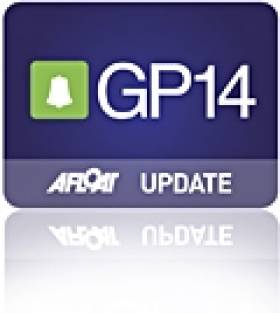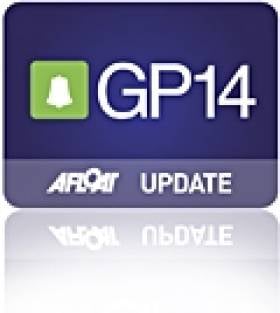Displaying items by tag: GP14 Class Association
Dead Heat for GP14 Ulster Title
#gp14 – Top placed Irish boat at the recent GP14 World championships Ger Owens and Melanie Morris have won the GP14 Ulsters. Held over the weekend 1st & 2nd September on Larne Lough the 2012 Championship produced a series of races packed with excitement, a tinge of terror and a dead-heat for first place.
Hosted by East Antrim Boat Club the championship was scheduled for six races with Irish Olympian Ger Owens partnered as usual by local girl Melanie Morris defending the title against 42 other competitors.
Day one race one saw the expected forecast materialising. The capsize list grew. In the end it was the McGuiness brothers John & Donal who took the 50-year-old Belfast Telegraph trophy back to Moville in the county of Donegal. By the start of the second race the conditions blowing across Larne Lough were way ahead of the forecast. Wind speeds of some 28 knots were recorded. Race officer Richard Doig kept the show running to allow Shane McCarthy & Damian Bracken a white knuckle victory. With conditions worsening – wind speeds of plus 38 knots – the fleet made its dramatic dash for shore. Many crews displayed the tell-tale black (mud) mainsail top, and pale complexions! Safety Officer Stephen Craig and his team were at full stretch.
Sunday dawned with contrasting conditions. Although shifty the light SWS breeze held to allow a further three races to be sailed. The keen fleet encountered several general recalls and continually bunched up featuring an abundance of place changing.
However it was the Owens-Morris team who mastered the intricacies of this inland Irish Lough. They took three straight bullets! Their late late show resulted in a tie on overall points which was resolved on count-back. Owens & Morris had successfully defended their title to again accept the ancient and battered brass bell which was first presented to the class in 1953.
Running in tandem with the main championship was the 'masters' series. This was won by 68-year-old Curly Morris crewed as usual by Laura McFarland. Keen competition was also recorded within the Silver and Bronze fleets. Son and father Daniel & Hugh Gill from north Dublin's Sutton club took the silver league while Newtownard's Michael Cox & Joshua Porter won the bronze league.
Speaking at the slick prize-giving the GP14 Irish Association's new President Laurence Balham echoed Ger Owen's comments on the professionalism of East Antrim's organisation. He plied particular praise on the race committee's skill in completing the series in the most challenging of conditions.
OVERALL RESULTS for ULSTER CHAMPIONSHIP:
|
pos |
Crew |
Club |
|
1 |
Ger Owens & Melanie Morris |
Royal St George YC/East Antrim BC |
|
2 |
Shane McCarthy & Damian Bracken |
Greystones SC/Clontark Y&BC |
|
3 |
Tim Corccoran & Brendan Brogan |
Sligo YC |
|
4 |
Danial & Hugh Gill |
Sutton DC |
|
5 |
Curly Morris & Laura McFarlane |
East Antrim BC |
|
6 |
John & Donal McGuiness |
Moville BC |
Irish GP14 Victory Goes to Senior and White on Belfast Lough
#gp14 – The GP14 Irish National Championships took place last Saturday and Sunday at Ballyholme Yacht Club. The event was kindly sponsored by Craftinsure Insurance and North Down Borough Council Tourism. Almost 40 boats from Ireland and England attended the event which was seen as a warm up event for the World Championships in Cornwall in three weeks time. Full results are downloadable as word doc below.
Racing was delayed on Saturday morning due to a lack of wind. The wind eventually filled in to 15 – 18 knots from the south to give three full length races. All three races were won by the English pair, Mike Senior and Chris White. With the forecast of heavy winds on Sunday the Race Officer, Robin Gray, was determined to get three races completed on Saturday to constitute a series.
As it was the winds did increase for racing on Sunday but did not stop racing going ahead. Two races were completed with winds reaching 28 knots at times. Mike Senior and Chris White coped best in the testing conditions and continued their dominance to score two further wins. The competition for second place was very tight with Shane MacCarthy and Andrew Thompson coming in just ahead of Simon Potts and Pete Grey. Shane and Andrew were first Irish boat. Ross Kearney, formerly from North Down but now working and living in England came in fourth with his crew Ed Bradburn.
The Silver Fleet was won by Gerard O'Sullivan and Hugh McNally who finished well inside the gold fleet boats in 11th place overall. First in the Bronze Fleet went to Michael Cox and Nigel Sloan from Newtownards. Michael and Nigel finished 22nd overall.
Mike Senior's dominance puts him in strong contention for the World Championships in August. Almost 20 boats from Ireland will be making the journey across to compete in the week-long event. A fleet of 130 boats are due to take part.
The final results of the event were as follows:-
1st Mike Senior & Chris White
2nd Shane MacCarthy & Andy Thompson
3rd Simon Potts & Pete Grey
4th Ross Kearney & Ed Bradburn
5th Dave Young & Shona Fleming
6th David Fletcher & Laura McFarland
7th Graham Elmes & Melanie Morris
8th Keith Louden & Dessie Hughes
9th Bryan Willis & Ruan O'Tiarnaigh
10th Alistair Duffin & Paul Whitcombe
Silver Fleet
1st Gerard O'Sullivan & Hugh McNally
2nd Daniel Gill & Cillian McGreer
3rd Daniel Gallagher & Gareth Gallagher
Bronze Fleet
1st Michael Cox & Nigel Sloan
2nd James Ogg & Ronan O'Beirne
3rd Peter Smyth & Jackie Malone
GP14 Class Association of Ireland
GP's have the largest and most active two person senior dinghy racing fleet in Ireland and we can prove it, by counting active boats and fleets. The GP is a one-design 14ft dinghy, raced by a crew of two. It is a three sailed 'mid-performance' boat which can be sailed safely in a wide range of sea and weather conditions, by moderately competent crew or it can be enjoyed while racing on the edge with spinnaker up in force 5 and 6 winds or tactically gaining inches, in a large championship fleet in a flat calm. It is a forgiving boat, easy to learn in and tolerant of a wide range of crew weight or experience.
There are seven national sailing events organised each year by the Class in Ireland. Each month from May to October there is at least one Open Meeting or Championship with attendances varying from 20 to 60 boats, depending on time of year, venue etc. On the water places are hotly contested by crews of the Gold, Silver and Bronze fleets from all around the country and off the water yarns and tips are just as hotly traded and good humored banter is the currency. Anyone who is even a little competitive soon gets hooked on the circuit and quickly makes new friends right across the spectrum of sailors both male and female. The GP14 has been popular here for 40 years and currently has fleets in 17 clubs around the country, where crews of all ages enjoy racing in brand new or older fibreglass or wooden boats costing from €1000 to €12000. The International Class Association keeps the GP14 up to date by continuous development and improvements, carefully designed not to prejudice older boats, while at the same time improving its appeal and ease of maintenance. Cost of ownership is kept down by a special class insurance scheme and restriction on the prices of major items such as sails and spars.
The GP14 Class Association of Ireland
There are about 400 GP's in Ireland with nearly 200 Association members and a strong organisation that looks after their interests with the help of the International Class Association, based in England. Our association provides a lot of help and guidance for members in areas such as Insurance, boat buying, boat tuning, race training, boat building, clubs where GP14s are sailed, World, National and Area Championships and Open Meetings etc.
In Ireland each year there are seven sailing meetings organised around the country including a Junior and Youth Championship, with entries ranging from 30 to 80 boats, most clubs are represented together with frequent visitors from the UK. There is a high standard of competition in the Class in Ireland, which has produced two World Champions and many ISA Champion of Champions and Irish boats regularly feature at the top of British Championships.
The Gp14 Class association of Ireland is organised on a regional basis by a volunteer committee who give of their time to ensure quality racing for all GP14 sailors.
(Above details courtesy of the GP14 Class Association of Ireland)
GP14 Class Association Of Ireland, c/o Tania MacHale, Secretary, Beech Cottage, Dromahair, Co Leitrim. Email: [email protected]
There is a space for Irish boating clubs and racing classes to use as their own bulletin board and forum for announcements and discussion. If you want to see a dedicated forum slot for your club or class, click here
Afloat's Graham Smith wrote, on March 2009: "If 2007 had been a good one for Sligo’s Tim Corcoran and Brendan Brogan, 2008 was even better as the Western crew dominated the GP14 class, winning everything in sight.
They won the Leinsters at Blessington and then the Ulsters at home in Sligo before going on to retain their National Championship title with success at Newtownards. These results saw them win the Traveller’s Trophy and they also won the Speed Sail League, one of the class’s special annual awards.
Gerard Healy won the Youth Championship while Curly Morris headed the Master’s Championship.
Four
new additions brought the national fleet up to 87 this year, with 60 of
them racing regularly at the 17 established GP clubs, while turnouts at
open events averaged the mid-20s. National Champions 2009: Tim Corcoran and
Brendan Brogan, Sligo YC"






























































